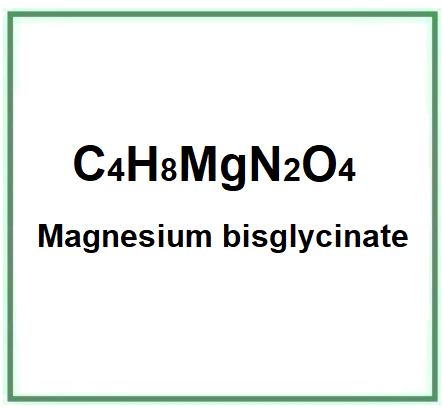Magnesium bisglycinate, also known as magnesium diglycinate, is a chelated form of magnesium and the amino acid glycine.
The name defines the structure of the molecule:
- Magnesium indicates the presence of magnesium ions (Mg2+) in the compound.
- Bisglycinate. The prefix 'bis-' means 'twice' and 'glycinate' refers to the glycinate ion, which is the deprotonated form of glycine. So 'bisglycinate' means that there are two glycinate ions associated with each magnesium ion.
The synthesis of magnesium bisglycinate involves the following steps (simplified explanation, the actual process may be more complex):
- Preparation of the glycine solution. Glycine, a simple amino acid, is dissolved in water to create a solution.
- Reaction with magnesium. A magnesium compound, such as magnesium oxide or magnesium carbonate, is added to the glycine solution. Magnesium reacts with glycine to form magnesium bisglycinate. The reaction can be represented as follows: MgO (or MgCO3) + 2 Glycine -> Mg(Glycinate)2 + H2O (or CO2)
What it is for and where
Medical
Magnesium bisglycinate is often used as a dietary supplement due to its high bioavailability and gentle effect on the stomach.
- Magnesium supplement. Magnesium bisglycinate is used as a magnesium supplement to prevent and treat magnesium deficiency. Magnesium is an essential mineral that plays a key role in numerous body functions, including protein synthesis, muscle and nerve function, blood glucose control and blood pressure regulation. It is also necessary for DNA, bone and RNA production.
- Gastrointestinal tolerance. Magnesium bisglycinate is often chosen as a supplement because it is less likely to cause laxative effects than other forms of magnesium. The glycine to which it is bound makes it easier on the stomach and less likely to cause diarrhoea.
- Supports mental health. Some research suggests that the glycine in magnesium bisglycinate may have calming effects on the brain, helping to reduce anxiety and promote better sleep.
- Bone health. Magnesium is important for bone health and adequate magnesium intake is associated with increased bone density.
- Cardiovascular health. Magnesium plays a key role in heart health. It helps maintain a normal heart rhythm and is often used to treat irregular heartbeats (arrhythmias).

- Molecular Formula C4H8MgN2O4
- Molecular Weight 172.42 g/mol
- CAS 14783-68-7
- UNII IFN18A4Y6B
- EC Number
![]() Magnesium bisglycinate
Magnesium bisglycinate 


